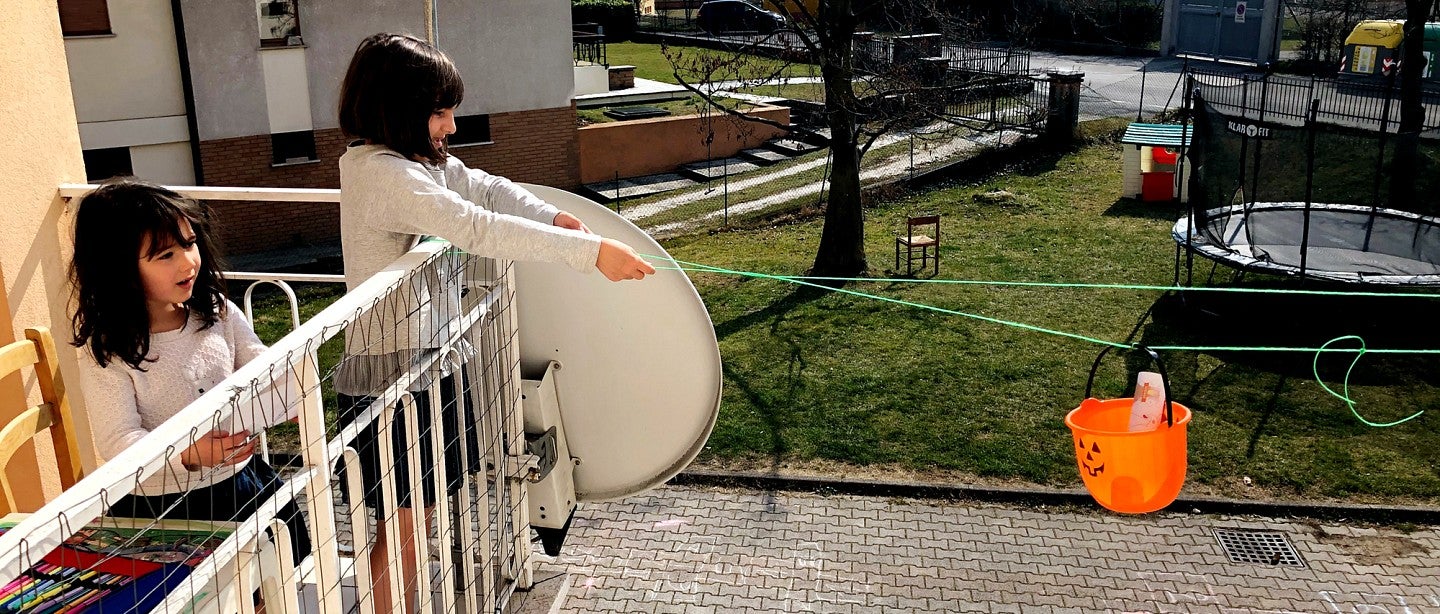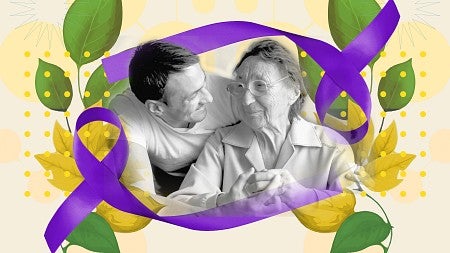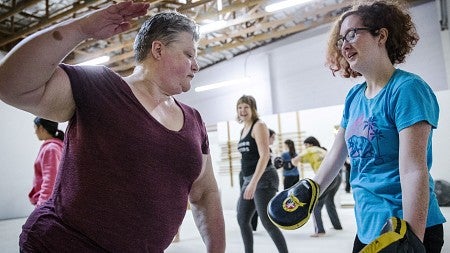
On a Balcony in Belluno, Overlooking a Pandemic
A UO expert in medical history, quarantined in Italy, observes the devastation of a virus
By Laurie Notaro • Photo Courtesy Melissa Graboyes • April 16, 2020
9 min read
In the small Italian town of Belluno in the Dolomite mountains, there is no noise. Silence lies over the town like a layer of smoke until it is interrupted by the sound of another ambulance.
University of Oregon professor Melissa Graboyes watches her daughters, ages five and nine, play with the children next door. They play on separate balconies, 10 feet apart. The girls chat with each other and play games that don't require physical contact.
It is mid-March, nine weeks since COVID-19 (coronavirus) attacked the country, and the eighth week that Graboyes and her family have been in quarantine.
Graboyes, an associate professor in the Clark Honors College and expert in medical history, was in Milan in early January as the virus took hold in China and reports began trickling out. She has spent her career studying infectious diseases and global health interventions—how malaria swallows African countries and kills thousands. Outbreaks are her expertise; the progression, the response, the outcome. She was in Italy for research on her upcoming book about the history of malaria interventions in Africa, supported by a National Science Foundation CAREER grant. The first stories about the spread of COVID-19 in China were warning signs she hoped she would never see.
“I found it alarming,” she says. “Mostly, that asymptomatic transmission had been reported in the medical journals but it wasn’t being taken seriously as a likely route of new infections. Even the World Health Organization was minimizing this as a driver of infection.” She immediately went out and bought surgical masks.
Too close to the red zone
It only took weeks for the virus to not just arrive in Italy but overwhelm it, and in locations near Graboyes, her husband, Alfredo Burlando, a UO economics professor, and their daughters. The local news confirmed the transmission and the Italian government quarantined 11 towns within a zona rossa (“red zone”)—a designation representing the severity of the situation.
“I was really alarmed by the number of cases that popped up so quickly. I knew enough about the basic epidemiology of the disease to know that by the time cases showed up at the hospital, there had been silent transmission for a few weeks prior, and that local transmission was probably quite entrenched already,” she says.
She felt uncomfortable being close to the outbreak, and quickly moved the family to the home of in-laws in Switzerland.
Friends and family chided her for “overreacting,” but Graboyes felt strongly that they needed to leave.
She explained to her daughters that they were going to Switzerland to keep safe while watching how the disease unfolded. They left Milan on the night of February 23.
Graboyes and her family were in Switzerland for only a week before they were called back to Italy to celebrate the birthday of a beloved, 95-year-old uncle. She didn’t want to return; she knew the risks and was upset at the prospects of being so close to the spread of the virus. But she relented, primarily because her in-laws needed to return to Switzerland and offered their apartment in Belluno in exchange.
Arriving in Belluno on March 1, Graboyes and her family found the situation relatively quiet. But in the following two weeks, the number of cases increased gradually, then quickly, then exponentially. By mid- March, Graboyes described the situation as “devastation,” insisting that is the right word to use. Compared to areas across the globe, Northern Italy had the most cases, the most deaths, the fastest rate of growth. Prime Minister Giuseppe Conte and the governors of the Lombardy and Veneto provinces had begun calling the fight against the spread of the disease a “war.”
“They are right. Just as much is at stake and there is no other reasonable comparison,” she wrote to friends back in the United States, in one of her monthly updates of her family’s life abroad, which had, only a month earlier, been full of details about trips to Zanzibar for research, the girls’ grasp of the Italian language, and the elaborate, widespread fireworks display on New Year’s Eve.
By March, those lighter missives had given way to somber passages: “Life feels perilous and fragile, and thus individual moments are now taking on greater weight and feel increasingly valuable.”
On March 11, the country enacted a strict quarantine on all 60 million citizens.
Slow to Respond
Graboyes felt waves of dread as cases were first reported in Seattle and California. In a sense, she was reliving the previous weeks of her life; she read the news stories and felt exactly the way she had while reading the news in Italy.
“As the cases started coming in, I felt like screaming because the response felt like it was happening in slow motion,” she says. “So slow to shut things down, so slow to clearly message to the public about what they needed to do, so slow to get testing capabilities online, so slow to shift hospitals into an emergency situation, so slow to acknowledge that this wasn’t just a bad flu, that it wouldn’t just affect old people, that this was an emergency.”
She was prepared for an inadequate response in the United States; she was well aware of the history of underfunding of public health institutions such as the Centers for Disease Control and state-level public health offices. However, she was shocked by some of the early mistakes made in the US—particularly at the CDC, where personnel tried to make their own tests rather than adopt those already in use in other countries, and also shipped faulty tests.
“I also found it really surprising that the US seemed to act like they had to discover all the steps of how to respond,” she adds.
Having lived the first weeks of the outbreak already, she was frustrated about the COVID-19 response and that it seemed that “nothing was happening despite a lot of talking and planning.”
She, Burlando, and friend Eleonora Redaelli, a professor in the School of Planning, Public Policy, and Management who was also in Milan during a sabbatical, wrote a letter to university administration. They felt desperate about what they were witnessing all around them, and hoped that a letter drawing on their unique perspective would motivate the UO to act sooner than later.
“We didn’t doubt that smart people were involved or that they weren’t considering the right factors. We just wanted them to move faster because we were seeing what was happening in Italy and it was utter destruction,” Graboyes says. The letter, sent via email and outlining what they had seen and from their perspectives as experts, was also addressed to family and friends on the monthly Italian update list. In hours it was picked up by the Oregonian and Willamette Week. Within days, the Wall Street Journal and other publications had contacted Graboyes to interview her about strategies to fight the virus.
“While I’m sure (Italian) government experts knew in late February and the first week of March how quickly things could get very bad, the severity and gravity of the situation wasn’t clearly conveyed to the public,” Graboyes stresses.
This is the same mistake that was made in the US, she says, with constantly changing recommendations from the CDC and state-level health authorities. First, it was avoid groups over 100, then 50, then 25, then 10. “What the recommendation needed to be from the very beginning was: avoid people outside of your household if at all possible,” she says. “If that’s not possible, take appropriate protections: masks and gloves in addition to good hygiene and handwashing.”
Graboyes found it hard to sit, read the news, and do nothing. In late March, she launched a blog, Coronavirus Chronicles, that covers the spectrum of COVID-19; it spells out the data, transmissions, and timelines. She also includes entries, laced with her strong sense of humor, depicting slices of life from a small apartment with two very energetic children—one of whom “likes to lick anything.”
Life is Terrible
The weeks since late February have largely been a collection of endless days of bad news reports.
Her mother in-law, father-in-law, and brother-in-law became sick with the virus shortly after returning to Switzerland, racked with fevers and relentless coughs for three weeks. They recovered at home without hospitalization, but Graboyes and her husband were deeply worried and felt helpless. The movement restrictions in Italy prohibited leaving one’s town of residence, and borders with Switzerland were closed.
“Sometimes, life is terrible. This is one of those times.”
Often, Graboyes has a hard time calming her running mind. They aren’t sure when they will return to Eugene. They want to avoid returning to the US only to have to live through some of those same, horrible weeks all over again. “Right now we have plane tickets for August,” she says. “But I could envision a scenario where even at that point in time we may decide it’s safer to stay here than engage in that kind of travel. We’ll have to see.”
At one point early in the epidemic, she told her husband about how worried she was, fearing that one of them would become sick and have to go to the hospital alone, if there were even spaces available at the hospital. Burlando waited a moment and then said, “Sometimes, life is terrible. This is one of those times.”
A Transformative Moment
The balcony has become the town well in Belluno: it’s the place where neighbors can talk to one another and exchange news, check on each other, and pass the gossip they’ve heard about new cases in town, who is sick, and how the hospital is faring. The weather is warming now, and while Graboyes’ neighbors aren’t singing opera to one another, the balconies are where this community finds itself enough to keep going.
The family stays in pajamas late in the morning until it’s their turn to play outside in the shared garden space, which is cleaned with bleach after each use. They read, do puzzles, and practice violin. Her husband leads their older daughter through the homework sent electronically by their Italian public school.
“Now, when the girls want to play together, they run to the terrace, yell the neighbors’ names, and then the other little girls come to their patio so they can talk,” Graboyes explains. “They’ve got a pulley system with a bucket that runs between the patios and they trade toys back and forth. On warm days they sit on the terrace and paint and chat.”
“One day they counted how many times a man in our neighborhood ran by; the old restrictions allowed for solo physical exercise but you had to stay in your neighborhood, so he was doing laps around the block,” she adds.
“It’s given us an opportunity to talk to our children about important things: our obligations to take care of others, the sacrifices individuals sometimes need to make to protect other people who are more vulnerable, how people can find many different ways of helping even if they aren’t nurses or doctors, and the ingenuity and courage people show in difficult circumstances.”
Graboyes sees this as a transformative moment for her children. “It’s the kind of thing you remember for your entire life and it has the potential to shape the way you see yourself, your place in the world, and your responsibilities to other people in this world,” she says.
“This is a terrible event to live through,” she adds, “but I think it also has the potential to shape our kids in profoundly positive ways.”
Laurie Notaro is director of communications for the Clark Honors College.




